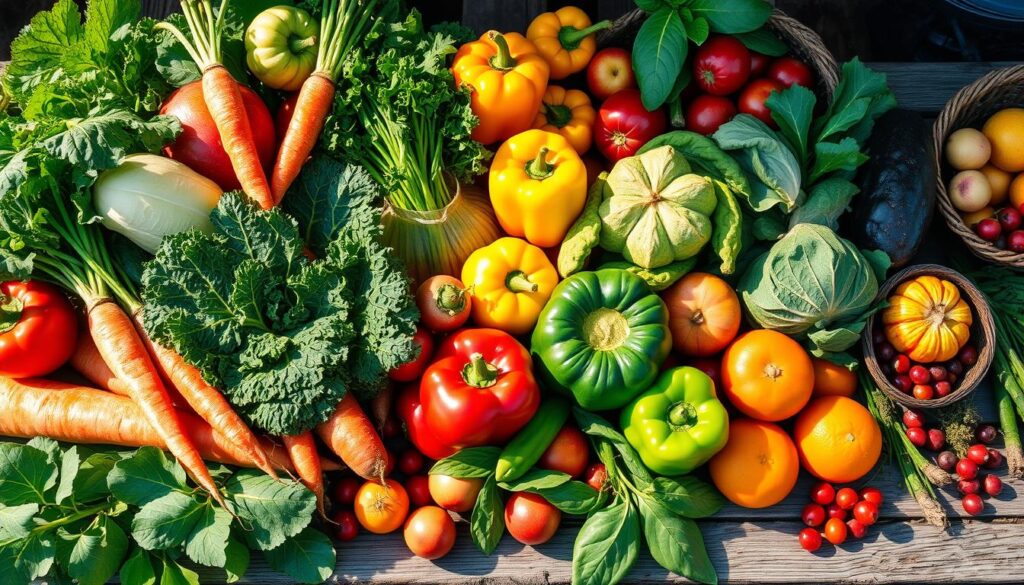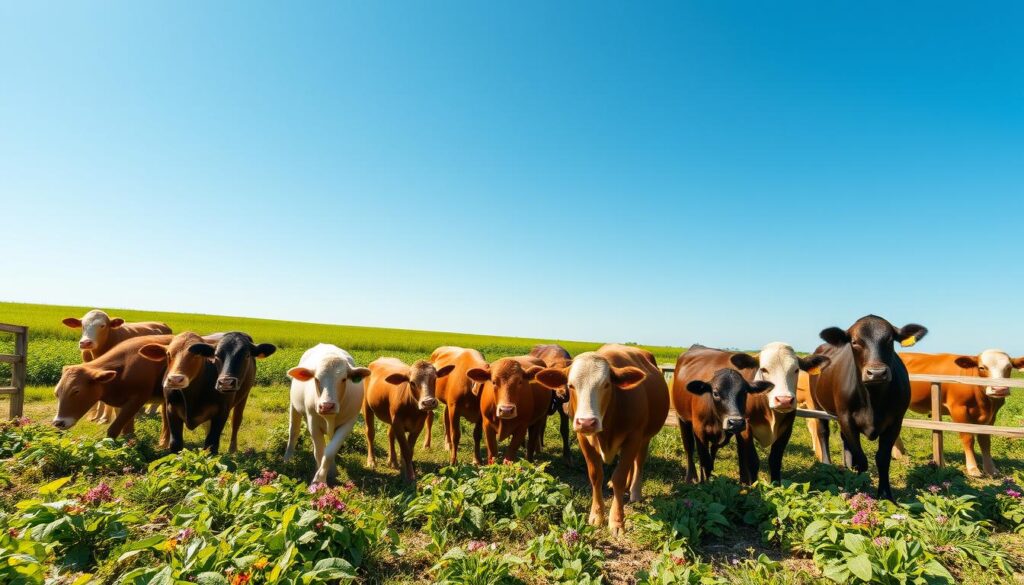Are you tired of using conventional meds for your health issues? It’s time to look into natural options that boost your immunity and fight infections without antibiotics’ side effects. We’ll explore how sustainable agriculture and natural farming practices lead to healthier food and a cleaner environment.
Key Takeaways
- Discover the natural alternatives to traditional antibiotics that can support your overall health and well-being.
- Understand the rise of antibiotic resistance and its global implications for public health.
- Explore the true cost of antibiotics in food production and the environmental impact.
- Learn about the benefits of adopting an antibiotic-free lifestyle for your health, the environment, and the economy.
- Uncover the antimicrobial properties of natural remedies, including essential oils and traditional medicinal plants.
Understanding the Rise of Antibiotic Resistance
The overuse and misuse of antibiotics have caused a big health problem worldwide. We’ll look at the current situation and the worries of doctors and scientists.
Global Health Implications of Overuse
Antibiotic resistance is a big issue that affects everyone. The World Health Organization says it’s one of the biggest health threats. Antibiotics are used too much in hospitals, farms, and daily life. This has made bacteria resistant to drugs, making infections harder to treat.
Current Statistics and Trends
- Antibiotic-resistant infections kill 700,000 people every year. This number could go up to 10 million by 2050 if we don’t act.
- In the U.S., 2.8 million people get infections from antibiotic-resistant bacteria each year. This leads to over 35,000 deaths.
- Using antibiotics in animal farming is a big problem. Up to 80% of antibiotics in the U.S. are used for animals.
Medical Community Concerns
Doctors and health experts are very worried about antibiotic resistance. They say if we don’t do something, simple infections could become deadly again. Making new antibiotics is hard, so we need to keep the ones we have working.
Eating organic and chemical-free food can help fight this health crisis. By cutting down on antibiotics in farming and supporting green farming, we can make a difference.

The True Cost of Antibiotics in Food Production
As we learn more about antibiotic resistance, it’s key to understand the costs of using antibiotics in farming. These drugs harm our health and the environment. They also affect our economy.
Choosing hormone-free meat and clean eating can change the game. It helps us stay healthy and supports a greener future.
The Environmental Toll
Antibiotics in farming pollute our soil and water. They harm wildlife and ecosystems. This leads to more resistant bacteria, threatening us all.
Economic Implications
Treating antibiotic-resistant infections costs a lot. By picking hormone-free meat and clean eating, we save money. We also support a better food system.
“The overuse of antibiotics in agriculture is a critical public health issue that we can no longer ignore. By making informed choices about the food we consume, we can be part of the solution.
A Call to Action
We can make a difference by backing producers who use antibiotic-free methods. Our choices help create a healthier world for all.

Using antibiotics in farming has big, long-term effects. By choosing hormone-free meat and clean eating, we help solve this big problem. We work towards a better food system for everyone.
No Antibiotics: A Path to Sustainable Health
Living without non-GMO antibiotics brings many benefits. It leads to sustainable health and well-being. By choosing eco-friendly practices, we improve our health, the environment, and the economy.
Benefits for Human Health
Staying away from non-GMO antibiotics is good for us. It makes our immune system stronger and lowers the risk of infections. It also helps our gut health, boosting our overall well-being.
Environmental Impact
Non-GMO antibiotics harm the environment. Using them less helps keep our ecosystems clean. This protects our planet for future generations.
Economic Advantages
Choosing an antibiotic-free life also saves money. Buying non-GMO products and supporting green farming helps our food system. It cuts healthcare costs and supports financial stability for the long run.
“Choosing a lifestyle free from non-GMO antibiotics is a powerful step towards a healthier, more sustainable future for ourselves and the planet.”
Natural Alternatives to Traditional Antibiotics
In today’s world, antibiotic resistance is a big problem. It’s time to look at nature’s power to fight infections. Antibiotic-free and natural farming are good alternatives to traditional medicines. They offer a sustainable and holistic way to stay healthy.
Essential oils are a great natural choice. These plant extracts are very strong and can fight many kinds of germs. Tea tree oil and oregano oil are just a few examples. They can protect us from infections without the bad side effects of traditional antibiotics.
Traditional medicinal plants are also a good option. Herbs like echinacea, garlic, and ginger have been used for ages to boost the immune system. When used right, these plants can be strong alternatives to antibiotics. They help us stay healthy without synthetic drugs.
By choosing antibiotic-free and natural farming, we can fight antibiotic resistance. We also support a more sustainable and holistic healthcare approach. It’s time to use nature’s medicine and empower ourselves with these natural alternatives.
“The greatest medicine of all is to teach people how not to need it.”
– Hippocrates
Herbal Remedies and Their Antimicrobial Properties
We’re excited to explore herbal remedies and their amazing antimicrobial powers. We’ll look at essential oils and traditional medicinal plants. It’s key to use organic and chemical-free ingredients in these natural remedies.
Essential Oils
Essential oils are known for their health benefits, including fighting off microbes. Oils like tea tree, lavender, and peppermint are strong against bacteria, fungi, and viruses. They can be used in many DIY products, like salves and diffusers.
Traditional Medicinal Plants
- Echinacea: This North American herb boosts the immune system and fights infections.
- Garlic: Known for its wide range of antimicrobial effects, garlic is used worldwide in traditional medicine.
- Turmeric: Its active compound, curcumin, has strong anti-inflammatory and antimicrobial properties.
Preparation Methods
It’s important to use organic produce and chemical-free food when making herbal remedies. These can be made into tinctures, teas, salves, or essential oil blends. The right preparation is crucial to get the most out of these herbs.
“The true medicine of the future lies in the plants that grow around us.”
Herbal remedies are a promising way to improve our health. By using the antimicrobial powers of these natural wonders, we can take care of our health in a sustainable way. This approach aligns with our values of wellness and caring for the environment.
Building Immunity Through Diet and Lifestyle
Boosting our immune system naturally is key to staying healthy. Simple diet and lifestyle changes can help our bodies fight off sickness better. We’ll look at the benefits of clean eating and using non-GMO products every day.
The Power of Clean Eating
Eating whole, unprocessed foods strengthens our immune system. Clean eating gives us vital nutrients and antioxidants. Adding more fruits, veggies, whole grains, and lean proteins to our meals boosts our health.
The Benefits of Non-GMO
Choosing non-GMO products is also vital. They avoid genetically modified organisms that can harm our gut. A healthy gut is key for a strong immune system. Non-GMO foods help our gut bacteria grow, boosting our defenses.
Lifestyle Factors
Our lifestyle choices also impact our immune system. Regular exercise, enough sleep, and managing stress are crucial. These habits work together with a healthy diet to make our bodies stronger against illness.
“A strong immune system is the foundation of good health. By empowering ourselves through clean eating and non-GMO products, we can take proactive steps to safeguard our overall well-being.”
Building a strong immune system is a journey. By combining a healthy diet, non-GMO choices, and a good lifestyle, we can stay healthy and resilient for the long term.
Clean Eating: Choosing Antibiotic-Free Foods
Understanding antibiotic-free foods is key to better health. We’ll guide you on how to read labels and know the certifications. This knowledge helps you make choices that are good for you and the planet.
Reading Labels Effectively
Reading food labels can be tough, but it’s essential. Look for “no antibiotics added” or “antibiotic-free” labels. Also, check for USDA Organic or Animal Welfare Approved certifications. These show the food is raised responsibly.
Understanding Certification Standards
- USDA Organic: This label means the meat or poultry was raised without antibiotics or growth hormones. The animals also get to go outside.
- Animal Welfare Approved: This certifies that animals were raised with the highest care. They avoid routine antibiotics.
- Certified Humane: This label ensures animals were raised with care. No antibiotics were used for growth.
Knowing these certifications helps you choose products that match your values. This supports a healthier, more sustainable food system.
| Certification | Antibiotics Usage | Animal Welfare | Sustainable Agriculture |
|---|---|---|---|
| USDA Organic | No routine antibiotics | Access to outdoors | Sustainable farming practices |
| Animal Welfare Approved | No routine antibiotics | Highest welfare standards | Sustainable farming practices |
| Certified Humane | No antibiotics for growth | Raised with care | Sustainable farming practices |
Choosing hormone-free meat and sustainable products supports a healthier future. It’s good for us and the planet.
Food Scan Genius: Your Guide to Antibiotic-Free Products
Exploring eco-friendly and chemical-free food options is now easier with Food Scan Genius. This app helps you find antibiotic-free products, spot hidden allergens, and get detailed nutrition info. All you need is your smartphone.
Goodbye to guessing what’s in your food. Food Scan Genius lets you scan barcodes to get instant info. It shows if products are antibiotic-free and if they have common allergens. This app gives you control over what you eat.
The app also breaks down a product’s nutrition. This helps you choose foods that fit your health goals. Whether you want to avoid chemicals or support the environment, Food Scan Genius is your ally.
- Quickly identify antibiotic-free products with a simple scan
- Uncover hidden allergens and potential sensitivities
- Access detailed nutritional information at your fingertips
- Support eco-friendly practices and chemical-free food options
Start your journey to a healthier lifestyle with Food Scan Genius. It’s your guide to finding antibiotic-free and eco-friendly products. Download the app now and take the first step towards a better you.
“Food Scan Genius has been a game-changer for me. I no longer have to guess about the ingredients or worry about potential allergens. It’s empowered me to make informed choices that align with my values.
| Feature | Description |
|---|---|
| Antibiotic-Free Identification | Instantly identify products that are certified antibiotic-free, helping you make informed choices. |
| Allergen Detection | Uncover the presence of common allergens, allowing you to avoid potential sensitivities. |
| Nutritional Breakdown | Access detailed nutritional information, including calories, macronutrients, and more. |
| Eco-Friendly Insights | Discover products that align with your commitment to eco-friendly practices and chemical-free food. |
Sustainable Farming Practices for Antibiotic-Free Production
As we try to use fewer antibiotics, natural farming is becoming more important. It helps keep our animals healthy and supports a greener future. This way, we can make our food system better for everyone.
Natural Animal Health Management
Good animal health is key to no antibiotics. We use a whole-body approach to help animals fight off sickness. This includes the right food, less stress, and natural treatments like herbs and oils.
Preventive Care Strategies
We focus on stopping health problems before they start. This means regular vet visits, keeping animals safe, and making sure they’re happy. These steps help keep animals healthy and cut down on antibiotic use.
Going green in farming does more than just help animals. It also protects our planet, keeps ecosystems diverse, and supports a better food system. This way, we make food that’s good for us and the Earth. It’s a win-win for everyone.
| Sustainable Farming Practices | Benefits |
|---|---|
| Natural Animal Health Management | Improved livestock health, reduced antibiotic use |
| Preventive Care Strategies | Proactive disease prevention, minimized need for antibiotics |
| Organic and Natural Farming Techniques | Environmental sustainability, ethical food production |
The future of food lies in sustainable practices that prioritize the health of our animals and the environment. By embracing natural farming, we can create a more resilient and antibiotic-free food system.”
Making the Transition to an Antibiotic-Free Lifestyle
Starting a clean eating lifestyle and using non-GMO products is a big change. It can make you healthier and help the planet. We’ll show you how to make these changes easy and natural.
Finding the right clean eating options and non-GMO products can be hard. But don’t worry, we’re here to help. We’ll give you tips and insights to make the switch smooth. By eating whole foods and choosing certified products, you’ll live a healthier, antibiotic-free life.
Change is exciting, and we’re here to explore it with you. Taking small steps towards clean eating and non-GMO living has many benefits. You’ll feel better and help the environment. This journey will empower you to care for your health and the planet.
FAQ
What are the benefits of choosing antibiotic-free and natural farming practices?
Choosing antibiotic-free and natural farming practices has many benefits. It improves human health and has a positive effect on the environment. It also offers economic advantages.
By avoiding antibiotics in food, we fight antibiotic resistance. This supports sustainable agriculture and gives us cleaner, more nutritious food.
How can I identify antibiotic-free and chemical-free food products?
When shopping, look for labels that say the food is antibiotic-free and chemical-free. Check for USDA Organic and Non-GMO Project Verified certifications. The Food Scan Genius app can also help find these options.
What are some natural alternatives to traditional antibiotics?
Natural alternatives to antibiotics include essential oils and traditional medicinal plants. Herbal remedies also work. These natural options use nature’s power to fight infections without conventional meds.
How can I build my immunity through diet and lifestyle changes?
To boost your immunity naturally, eat healthy and make lifestyle changes. Eat more organic and non-GMO foods. Get enough sleep, manage stress, and stay active to support your body’s defenses.
What are the global health implications of antibiotic overuse?
Antibiotic overuse has led to a crisis of antibiotic resistance. This is a big health problem worldwide. It makes treating infections harder, leading to more sickness, death, and healthcare costs.
How can sustainable farming practices support antibiotic-free production?
Sustainable farming practices help with antibiotic-free production. They focus on natural animal health and preventive care. This approach reduces the need for antibiotics and makes food production cleaner and more sustainable.
What are the steps I can take to transition to an antibiotic-free lifestyle?
To transition to an antibiotic-free lifestyle, make gradual changes. Start by eating cleaner, choosing organic and non-GMO foods. Learn about certifications and label reading to find antibiotic-free options. Use natural remedies and support sustainable farming for a healthier lifestyle.






9 Comments
Your comment is awaiting moderation.
[…] heart health benefits come fast. The twin study showed big changes in the first four weeks7. So, switching to a […]
[…] Reading labels can be tough, but the Food Scan Genius app makes it simple. Scan a barcode, and it breaks down the ingredients. This way, you can easily find natural sugar alternatives. […]
[…] Health Benefits […]
[…] Yuka app alternative offers something special for your health. Whether it’s nutrition, fitness, or personal care, there’s an app for your […]
[…] probiotic foods, scanning labels wisely, and consulting experts when needed. Your gut’s immune system has the power to protect you—unlock it […]
[…] a key player in allergy prevention. By keeping cuts clean, moisturized, and covered, you teach your immune system to stay calm. Early food introduction under doctor care also […]
[…] wondered why your body reacts so strongly to certain foods? It’s not just a dislike—it’s your immune system going into overdrive. A food allergy happens when your body mistakes a harmless ingredient, like […]
[…] you find local markets, connect with CSAs, and discover seasonal produce. We aim to support local food systems and help you make choices that benefit your community and the […]
[…] allergens are proteins in foods that can cause an immune system reaction. People with food allergies may experience symptoms from mild to severe. It’s […]
[…] Allergy: An immune system response to milk proteins, potentially causing severe […]